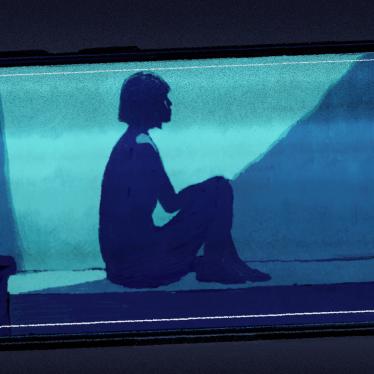(New York) – The Chinese government’s new official judicial interpretation expanding existing law to punish “online rumors” is a major blow to freedom of expression in China, Human Rights Watch said today. The judicial interpretation, which went into effect on September 10, 2013, will make it easier for authorities to jail people for peacefully exercising their right to expression on the Internet.
“Although China’s cyberspace has always been tightly controlled and censored, the new criminal penalties for online expression are a direct assault on the relatively freer space generated by social media,” said Sophie Richardson, China director. “The government claims these new penalties focus only on malicious and libelous content, but critics of the government and whistleblowers are the real target.”
The judicial interpretation was jointly issued by the Supreme People’s Court and the Supreme People’s Procuratorate (the state prosecution) on September 9. It makes the crimes of defamation, creating disturbances, illegal business operations, and extortion applicable to expressions in cyberspace.
“Creating disturbances,” “extortion,” and “illegal business operations” are already routinely used to detain and jail individuals for their human rights activism, but the interpretation expands the test of what constitutes an offense from actual actions to online expression.
Government censors have long pressured netizens and companies that host online forums to avoid or take down material that authorities find objectionable. But defamation is a criminal offense under Chinese law. Anyone who “publicly humiliates” or “invents stories” about another person can be sentenced to up to three years in prison if “the circumstances are serious,” according to article 246 of the criminal law.
The new judicial interpretation defines serious circumstances in several ways, including situations in which people view or click on information more than 5,000 times or the information is reposted over 500 times. This is a low threshold, considering that popular topics on weibo are often reposted thousands of times.Prosecution for defamation can be initiated by the government, rather than a private party, when it “seriously harms public order or the interests of the state.”
The new interpretation sets out seven such broad and ill-defined situations, including when the information leads to mass protests, public chaos, ethnic or religious clashes, adverse social impact, damage to the nation’s image or national interests, damage with an international impact, and a catch-all category of “other” damage.
“The new interpretation is worded so vaguely, and the standards for ‘serious circumstances’ so low, that anyone can be jailed for exposing official wrongdoing, or indeed saying anything the government doesn’t like,” Richardson said. “If the government is genuinely concerned about false information spreading on the Internet it should allow a free press and end media censorship so that rumors can be effectively contested in public debate.”
Under the interpretation, people whose Internet posts abuse or threaten others, or who make up and distribute false information, can be prosecuted for “creating disturbances,” a crime under article 293 of the criminal law if the actions damage social or public order. Anyone who posts or removes messages in return for pay or for blackmail can be prosecuted for “extortion” and “illegal business operations.”
The new interpretation comes at a time of a widespread crackdown in China on activists, critics, and online freedom. Since August, the authorities have waged a campaign against “online rumors.” They have warned Internet users against breaching “seven bottom lines” in their Internet postings, have taken into custody the well-known liberal online commentator Charles Xue, have detained hundreds of Internet users for days, and have closed down over 100 “illegal” news websites run by citizen journalists. State media reported that the new judicial interpretation aims to provide a more explicit legal basis for charging people.
Human Rights Watch believes that criminal defamation laws should be abolished, as criminal penalties are always disproportionate punishments for harming a person’s reputation and infringe on free expression. The UN special rapporteur on the right to freedom of opinion and expression has repeatedly called on countries to repeal criminal defamation laws.
Such laws are open to easy abuse, resulting in very harsh consequences, including imprisonment. And as repeal of criminal defamation laws in an increasing number of countries shows, such laws are not necessary for protecting reputation. The new judicial interpretation in China thus goes against this international trend and serves to further entrench abusive practices.
“In this never-ending cat-and-mouse game between the government and netizens for real freedom of expression on China’s Internet, the authorities are setting new traps,” Richardson said. “At stake is one of the few mechanisms people in China have to hold authorities to account.”






